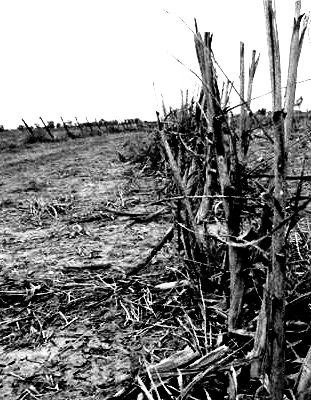MDBA sees echoes of early Millenium
 The drought gripping farms in Queensland and New South Wales is spreading, with Murray Darling irrigators set to feel the strain too.
The drought gripping farms in Queensland and New South Wales is spreading, with Murray Darling irrigators set to feel the strain too.
The Murray Darling Basin Authority (MDBA) says the system is on track this year to equal its fifth driest year on record.
The MDBA says flows into the river system are now as low as they were in 2002-2003 — at the start of the Millennium Drought.
It means only Murray irrigators with ‘high security’ licences will receive all the water they are entitled to this year.
NSW Murray irrigators with the lower level ‘general security’ licences will get access to just 12 per cent of their water entitlements, as well as some left over from last year.
The system is feeling the strain, with the massive Lake Menindee now bone dry, and the Lower Darling River in real trouble too.
Allocations for high security irrigators in the Lower Darling have been severely restricted, while general security licence holders in the area now have no allocation at all.
With scientists predicting the current El Nino system will intensify to record levels by the end of the year, the MDBA says irrigators across the Murray system must think seriously about how they manage risk this year and on into the dry and uncertain future.
“We'd be encouraging water users [not to] use any more water than they absolutely have to this year; it would be prudent to carry water forward [for the next year],” the authority's executive director of river management David Dreverman has told ABC reporters.
“We're in a very dry year. We're a lot better positioned to deal with that than we were a decade ago, but nevertheless, with all the climate signals we're looking at and the forecasts we're looking at, it would be very prudent for everyone in the Murray-Darling to be very, very careful about their water use this year.”
The MDBA says water stored in dams will only stretch so far.
“We're into a second dry year [in 2015] and we're going to get through with reduced irrigation usage, but it might be two-thirds of the long-term average [used annually for irrigation] when inflows are the fifth-driest year on record,” Mr Dreverman said.
“That's a pretty good outcome.
“What we found in the Millennium Drought was that our large storages — Dartmouth and Hume — can protect you from one year of severe drought, but they can't protect you year on year. They just eventually run out.
“Then you're reliant on only the inflow that comes into the storage in that year.
“In the Millennium Drought, we then had three consecutive years of relatively lesser inflows and our storages really bumped along close to empty for four years.”
But the authority says things have been even worse in recent years.
“We're not in the situation we saw in 2006,” Mr Dreverman said.
“At the time, we thought that 2002-03 was quite a bad drought - it was one of the worst we'd seen for irrigators.
“In hindsight, by the time we got to 2009, [2002-03] was actually quite mild compared to the four-year period from 2006 to 2009.
“In September 2015 we've had 490 gigalitres of inflow into the River Murray system, but in 2006 it was only 125 gigalitres for September. So, only about a quarter of what we've seen this year, and this year's very dry.”
NSW cut water allocations to irrigators mid-season in 2006, which triggered a crisis that changed water resource management and allocations in in the Basin.
There was a big political response back then too, with the passing of the Commonwealth Water Act in 2007 combined with a $10 billion fund aimed at returning water to the environment - the start of the controversial ‘Basin Plan’ water-sharing arrangements in the Murray-Darling.
Mr Dreverman said those tough early reforms have put the Basin in a better position now to cope with low inflows.
“In an extreme dry, we've changed the way we manage critical human needs, to make sure that our towns have water available to them, and that we have enough water to convey that water through the system, because the losses to evaporation in a 2,000 kilometre long river could be 1,500 gigalitres a year,” he said.








 Print
Print